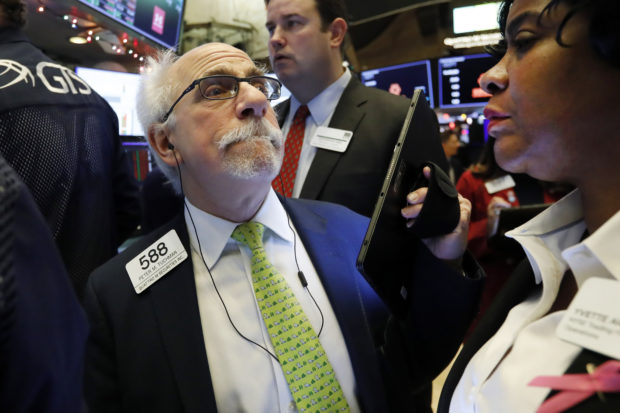Slight gains on Wall Street are enough for more record highs
Wall Street extended its milestone-shattering run Tuesday with modest gains for stocks, nudging the major indexes to more record highs.

FILE – In this Dec. 13, 2019, file photo trader Peter Tuchman left, works on the floor of the New York Stock Exchange. The U.S. stock market opens at 9:30 a.m. EST on Tuesday, Dec. 17. (AP Photo/Richard Drew, File)
The S&P 500 had its fifth gain in a row. The benchmark index and the Nasdaq closed at new highs for the fourth straight day. The Dow Jones Industrial Average also closed at a record high, it’s second milestone this week.
Banks and companies that rely on consumer spending led the way higher, outweighing losses in technology and health care stocks. Treasury yields gave back some of their gains from a day earlier, while the price of crude oil continued its recent march higher.
Investors welcomed encouraging reports on U.S. home construction, industrial production and job openings, extending the market’s upward momentum. Stocks have been vaulting higher in recent days on optimism about an interim U.S.-China trade deal announced on Friday. A Federal Reserve meeting last week also spurred buying after investors saw signals from Chairman Jerome Powell that interest rates will stay low for a while.
“A lot of the strength that we’re seeing is just a continuation of the ‘Phase 1′ U.S.-China deal from last week and some potential clarity around Brexit,” said Jamie Lavin, global investment specialist at J.P. Morgan Private Bank. “But, really, this morning one of the things that’s kept us higher is we did see some stronger economic data.”
The S&P 500 rose 1.07 points, or less than 0.1%, to 3,192.52. With less than three weeks left in 2019, the index is up 27.4% for the year.
Article continues after this advertisementThe Dow Jones Industrial Average gained 31.27 points, or 0.1%, to 28,267.16. The Nasdaq climbed 9.13 points or 0.1%, to 8,823.36. The Russell 2000 index of smaller company stocks picked up 7.63 points, or 0.5%, to 1,657.56.
Article continues after this advertisementBond prices rose. The yield on the 10-year Treasury fell to 1.88% from 1.89% late Monday.
The U.S. and China agreed last week to cut tariffs on some of each others’ goods and postpone other tariff threats. The interim trade deal has helped ease a key source of uncertainty for investors heading into next year.
The latest batch of economic data also helps buttress traders’ confidence in the health of the U.S. economy. In August, fears that the U.S. was headed for recession roiled markets.
The Fed said Tuesday that industrial production and manufacturing were stronger last month than economists expected, though they are weaker than a year ago. Industrial production rebounded to 1.1% growth in November from October, better than the 0.8% that the market was expecting. But it remains 0.8% below year-ago levels.
Housing data were also stronger than expected. Homebuilders broke ground on 3.2% more homes in November than October, well above the 1.2% growth that economists had projected. In addition, applications for building permits jumped to the highest level in 12 years.
Housing has been on the upswing for months following three interest-rate cuts by the Federal Reserve earlier in the year. The average rate on a 30-year fixed-rate mortgage is now almost a full percentage point below where it was a year ago.
“Now that (rates) are coming down, you’re seeing housing starts pick back up,” Lavin said.
Homebuilder shares were broadly lower following the report. KB Home fell 2%.
Banks notched the biggest gains Tuesday. Goldman Sachs Group rose 1.4% and Citigroup added 1.1%. Gains for Amazon, Target and other companies that depend on spending by consumers also helped to push the market higher, but drops for UnitedHealth, Boston Scientific and other health care stocks kept the market in check.
The technology sector, which has been the market’s strongest gainer this year, was the biggest loser Tuesday. Oracle slid 2.1% and Autodesk dropped 1.6%. Tech stocks have been prone to big swings with every hint of progress in the trade conflict between Washington and Beijing because of how much business the companies do in China.
However, Tuesday’s slide in tech stocks was probably due in part to investors cashing in on their big gains ahead of 2020, Lavin said.
“It’s been a strong year in equity markets and people are getting their portfolios ready for 2020, so it could be some profit-taking impact,” she said.
Netflix climbed 3.7% after the company reported breakdowns for its revenue and membership by region, which analysts said showed that Netflix has been increasing its prices steadily around the world.
Bed Bath & Beyond surged 11.2% after its new CEO shook up the company’s management by removing six senior executives, including its chief merchandising officer and chief legal officer. CEO Mark Tritton, who took over about two months ago, said it was the first in a number of steps Bed Bath & Beyond is taking to transform itself.
Worthington Industries jumped 8.8% after the metal manufacturer’s fiscal second-quarter results topped Wall Street’s forecasts.
Benchmark U.S. crude rose 73 cents, or 1.2%, to $60.94 per barrel. Brent crude, the international standard, gained 76 cents to $66.10 per barrel. Crude oil has been touching its highest price in three months.
Wholesale gasoline rose 3 cents to $1.69 per gallon. Heating oil climbed 3 cents to $2.03 per gallon. Natural gas fell 2 cents to $2.32 per 1,000 cubic feet.
Gold fell 40 cents to $1,474.60 per ounce, silver fell 4 cents to $16.98 per ounce and copper was unchanged at $2.82 per pound.
The dollar fell to 109.49 Japanese yen from 109.59 yen on Monday. The euro was unchanged at to $1.1147.
Major stock indexes in Europe finished lower.